It is critical for your business to have a stable relationship with your customers. Customer interactions grew more difficult to manage as a result of the many marketing channels and sales procedures. You're wasting money if you don't employ marketing automation and CRM.
To assist you, we'll explain the difference between CRM and marketing automation tools, as well as the advantages of each.
CRM and Marketing Automation Platform - The Main Difference
It is not uncommon for people to confuse CRM and marketing automation functions. Once you understand the differences, it's easy to understand how these tools complement each other and help grow your business. One of the main differences between these types of software is what they target.
CRMs are focused on organizing customer information and tracking customer interactions throughout the life cycle, while marketing automation is focused on promoting one-on-one communication to attract new customers through marketing and sales. Both CRM and marketing automation platforms are suitable for businesses of all sizes - small businesses and large corporations.
The philosophy of the entire CRM system is the concept that the center of any business is the customer. And accordingly, the direction of CRM tools is to ensure the effectiveness of those branches of business processes that are directly aimed at interacting with customers. The main ones are: sales, marketing, service.
However, in addition to the main function, the CRM system is an effective communication between employees and management, since time is saved, control over tasks is enhanced, the most accurate goals are planned, the number of errors due to the human factor is reduced, and transparency is achieved in the work of each employee.
[Related Article: 10 Best Free CRM Software]
What is a CRM?
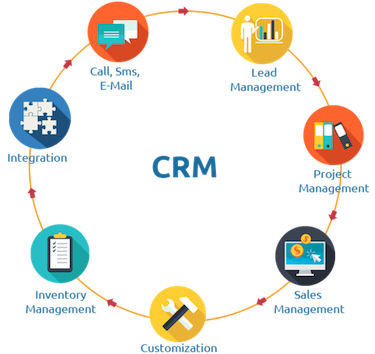
CRM software, often known as customer relationship management software, is a solution that manages contacts and sales, agent efficiency, and client relationships throughout the sales funnel, from marketing through customer service interactions.
A CRM also keeps track of information about your customers, such as how long they've been a customer, their purchase history, and notes from phone calls. A customer relationship management system (CRM) can help you improve customer interactions, boost sales, and streamline procedures.
A CRM may be utilized by nearly anybody in your company and maintains data from various departments in one convenient spot. [Related article: How to Choose the Right CRM]
Examples of CRMs
- Close CRM
- HubSpot
- monday CRM
- ActiveCampaign
- EngageBay
- Vendasta
- Streak CRM
- NetHunt CRM
- Pipedrive
- Zoho CRM
- Capsule
- Nextiva
- Teamgate
How does CRM software work?
A CRM tracks the actions of active and potential customers via your company's social media accounts, email, or website, gathers information, and guides each contact along a customer journey, such as sending a prompted email or notifying an employee of the customer's interest.
CRM software collects client information in an integrated manner. Sales, marketing, and service automation are all integrated into one with an all-in-one CRM. It streamlines the sales process by automating interactions, providing business intelligence, and empowering sales agents.
What are the benefits of CRM software?
Benefits of CRM software include:
- Your company can provide tailored promotional content that will increase the likelihood of a sale and establish trust between you and your customer.
- When engaging with a customer, you can have a complete picture of who they are and their history with your firm, allowing you to have a more personable and successful conversation.
- Many CRMs now integrate with social media networks, allowing you to see which channels are generating the most traffic and what people are saying about your business.
- When a call is scheduled, a client's account is ready to renew, or even a customer's birthday approaches, CRMs can send internal alerts to let your sales and service representatives know. [Related article: CRM Requirements Checklist]
What is marketing automation?
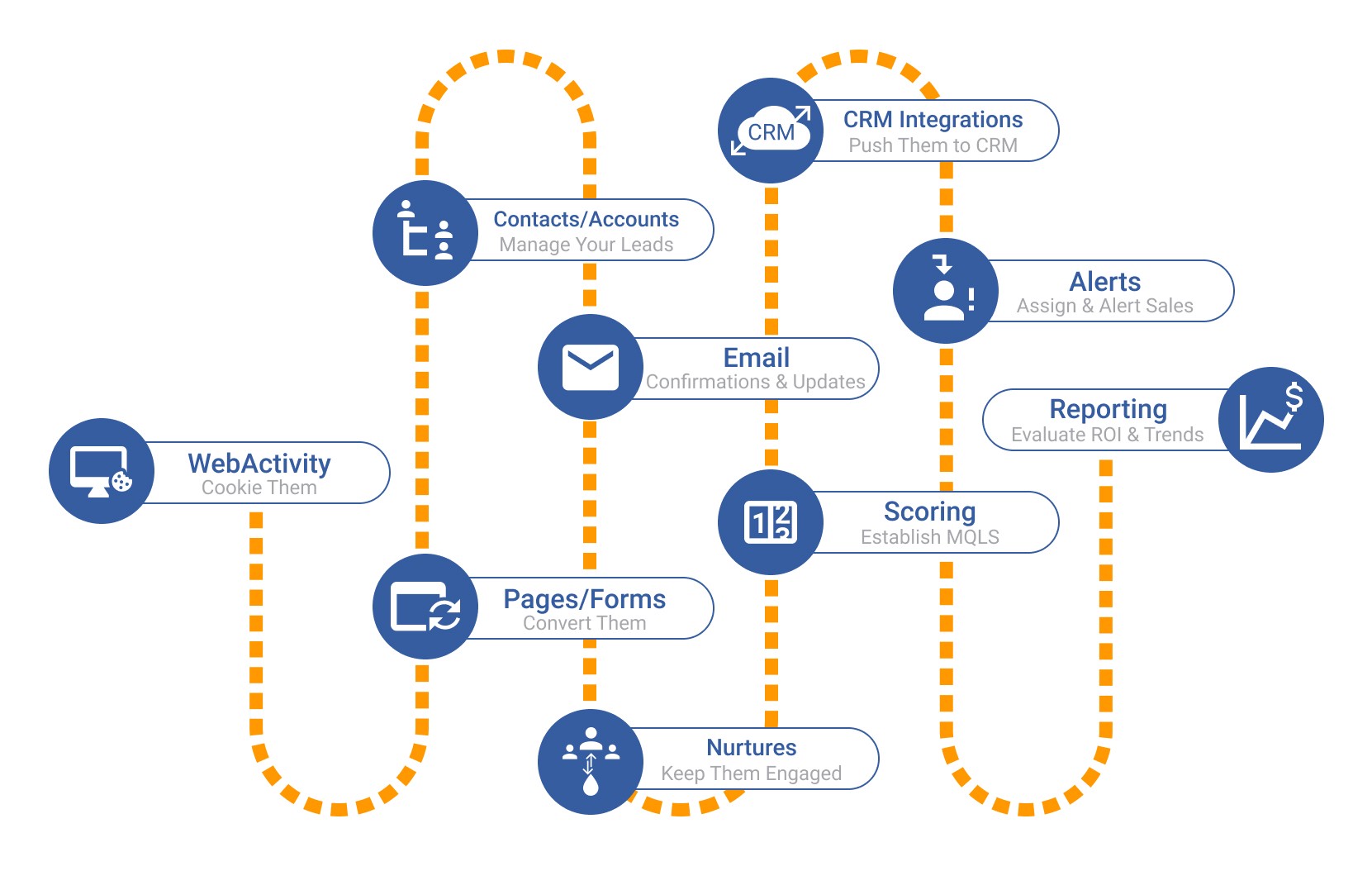
Marketing automation is a type of software that automates the management of marketing operations and multifunctional campaigns across many channels. Businesses can use marketing automation to send automated messages to customers via email, online, social media, and text. Messages are sent automatically, according to processes, which are sets of instructions. Workflows can be specified by templates, constructed from the ground up, or changed mid-campaign to improve results.
Marketing automation aids in the production, nurturing, and scoring of leads, as well as the measurement of total campaign ROI. The benefits of automation in terms of saving time and money increase as a company expands in size and complexity. Good marketing automation tools are built to grow with your company. [Realted article: Top 10 Best Marketing Automation Tools]
How does marketing automation work?
Marketing automation, as the term indicates, automates important marketing tasks. The software's goal is to free up resources in your company, saving you time and money while allowing you to try better targeting tactics.
Marketing automation software has four main components:
- Marketing database centralized. All data about potential leads, customer interactions, and user behavior is saved and evaluated in this location.
- Engine for engagement marketing. Your marketing processes are created, managed, and automated here.
- Engine for analytics. This is where you test, measure, and optimize your marketing ROI and revenue impacts, as well as identify areas for improvement, as the name implies.
- Stack of marketing technology The marketing technology stack is made up of all the various apps you employ to achieve your marketing objectives, such as SaaS platforms, social media tools, and content management systems.
What are the benefits of marketing automation?
Benefits of marketing automation software include:
- The ability to divide prospects into mailing lists depending on previous interactions with your company or their interests and preferences.
- The lead nurturing feature allows you to send triggered emails to people who are most interested in your product or service. You can also use a "drip" campaign to keep your company top-of-mind with prospects by sending a series of emails.
- When a campaign is finished, the system generates metrics that show how successful it was.
Why use marketing automation?
Marketing automation is used by the best marketing teams to improve campaign effectiveness, provide better leads to their sales teams, and increase ROI.
So, what is the difference between marketing automation and CRM? It's not that they're more capable, smart, or creative. They simply have the appropriate tools—tools that offer them a better understanding of the entire sales funnel and help them to discern when leads are ready to buy more effectively. These skills are becoming increasingly important in today's marketing world.
Marketers who use marketing automation are better equipped to qualify leads and send them on to sales, resulting in increased revenue and growth.
In short, marketing automation enables departments to show the return on investment of their efforts. Marketing departments are shifting from cost centers to revenue generators thanks to their capacity to demonstrate campaign efficacy. When marketing teams can demonstrate how their initiatives affect the bottom line, they are rewarded with more marketing budgets. Marketers are better equipped to try new things, get creative, and execute new initiatives that will empower a lead generation with additional support for their marketing campaigns.
Examples of marketing automation tools
Email distribution
Messages on the base will be sent automatically and at the most suitable time for this, for example, two days before the promotion.
Trigger messages
The client will automatically receive emails, SMS or notifications after he performs a certain action. For example, a person just needs to download a checklist to activate the automatic sending of a series of letters on a relevant topic.
Auto-information
You can automate marketing and communication with the client thanks to automated outbound calls. For example, this is a great opportunity to inform the client about an upcoming event.
Delayed posting
A company can publish content at the right place and at the right time. There are many services to automate this process. Thanks to delayed posting, the client will know what events, promotions and other activities will take place in the near future.
Planning
Marketing automation and scheduling software work well together. To increase the effectiveness of the marketing team, you can use notifications, for example, when it is time to submit a report.
What is marketing automation in CRM?
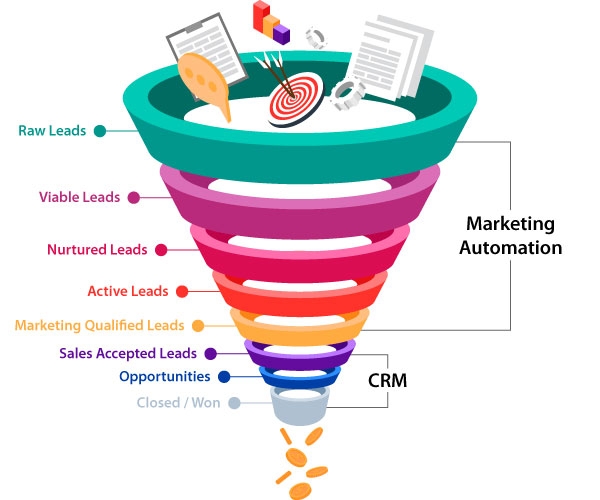
CRM and marketing automation software are frequently used in tandem to maximize their benefits and combine their strengths, despite the fact that they are two separate systems used for different objectives.
In tandem, marketing automation provides your CRM the detailed data it needs to provide meaningful insight into the present and potential consumers, what they want, what they don't want, and how to serve them to all organizational units.
You must first understand the difference between CRM and marketing automation before you can understand how they function together. CRM is mostly utilized for sales, whereas marketing automation is primarily used for lead generation and nurturing. As a result, combining them allows you to:
- Before sending a lead to sales, establish a relationship.
- Run closed-loop reporting to get a complete picture of what is and isn't working.
- Assign lead ratings
- Help sales professionals understand the big picture of a lead's experience with your firm by providing a seamless journey from visitor to customer.
- To support and nurture leads, use consistent messaging.
What is the difference between CRM and marketing automation?
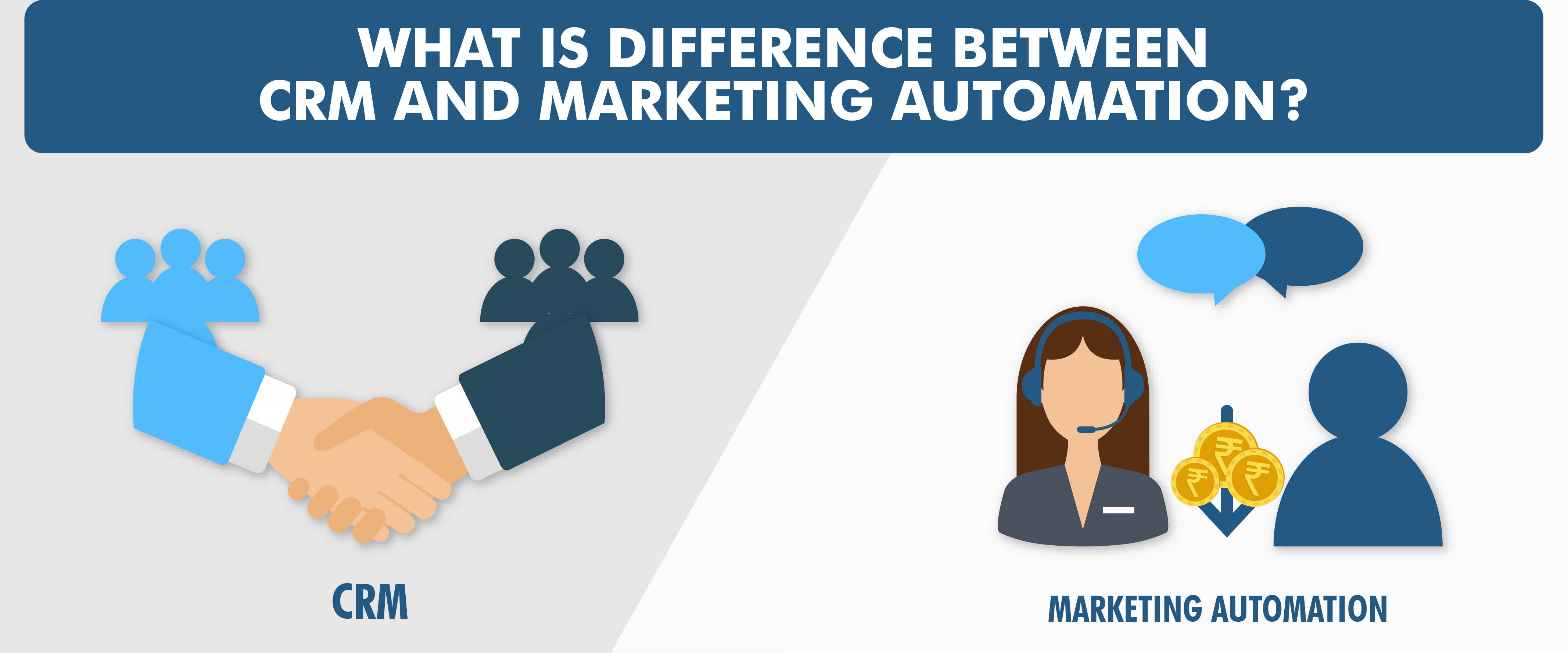
CRM and marketing automation have the same goal at their core: to collect and manage customer data, which is subsequently utilized to drive sales and marketing actions. While CRM is mostly focused on sales, marketing automation software is primarily focused on internet marketing. Many CRM systems include marketing automation features and vice versa. In essence, the difference between marketing and CRM is more of a matter of focus than anything else.
We discovered an incredible variety of techniques in our examination of a wide spectrum of companies. Small businesses would use Outlook to maintain their contacts and an Excel spreadsheet to track opportunities. They may then switch to Mailchimp or Constant Contact's free and subsequently paid versions.
We have seen a mix of legacy systems in larger companies, with Salesforce dominating the CRM scene. Some were combining CRM marketing automation tools like Hubspot or Acton and regularly sharing data between the two.
New businesses have the option of starting from the ground up, commissioning bespoke systems that incorporate CRM, digital marketing media, and marketing automation into one solution.
Best CRM and marketing automation for small business
The best marketing automation software for small business
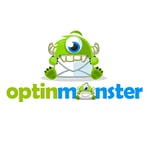 For all types of websites, OptinMonster is the best lead generation and conversion optimization software. It uses Exit-Intent technology to convert website users who are about to leave into subscribers and customers. OptinMonster is the most user-friendly and adaptable software for creating effective opt-in campaigns. It lets you test and tweak your marketing plan in real real-time. Although you may already have traffic, OptinMonster ensures that visitors do not leave your site without taking action. It's the ideal solution for converting people who have left your site into subscribers and customers.
For all types of websites, OptinMonster is the best lead generation and conversion optimization software. It uses Exit-Intent technology to convert website users who are about to leave into subscribers and customers. OptinMonster is the most user-friendly and adaptable software for creating effective opt-in campaigns. It lets you test and tweak your marketing plan in real real-time. Although you may already have traffic, OptinMonster ensures that visitors do not leave your site without taking action. It's the ideal solution for converting people who have left your site into subscribers and customers.
The best CRM for small business
 Freshsales offers a number of solutions to help small and mid-sized businesses better serve their customers, identify customer intent, and turn leads into sales. The Freshsales suite is an all-in-one CRM software that connects sales and marketing. It is a combination of the Freshworks automation software.
Freshsales offers a number of solutions to help small and mid-sized businesses better serve their customers, identify customer intent, and turn leads into sales. The Freshsales suite is an all-in-one CRM software that connects sales and marketing. It is a combination of the Freshworks automation software.
Freshsales uses the smart Freddy AI assistant to deliver clear insights on customer engagement, assisting businesses in finding leads, closing deals, and nurturing client relationships. On both desktop and mobile, the program provides an intuitive, user-friendly interface that allows for quick access to customer records and communications.
Third-party applications such as Gmail and Outlook are also simply integrated, allowing you to create bulk email templates while keeping track of both sent and received conversations with prospects.
[Related article: 10 Best Free CRM Software]
Which marketing automation software is the best
 Marketo Engage by Adobe is a popular marketing automation platform that provides a wide range of automation functions for any developing company. It's a robust marketing automation platform that includes email marketing, lead nurturing and scoring, and analytics.
Marketo Engage by Adobe is a popular marketing automation platform that provides a wide range of automation functions for any developing company. It's a robust marketing automation platform that includes email marketing, lead nurturing and scoring, and analytics.
Marketo also includes advanced capabilities like mobile engagement, website retargeting, and content personalization. Marketo is a marketing automation system that is best suited for commercial customers, but it can be used by organizations of all sizes.
Why integrate CRM and marketing automation software
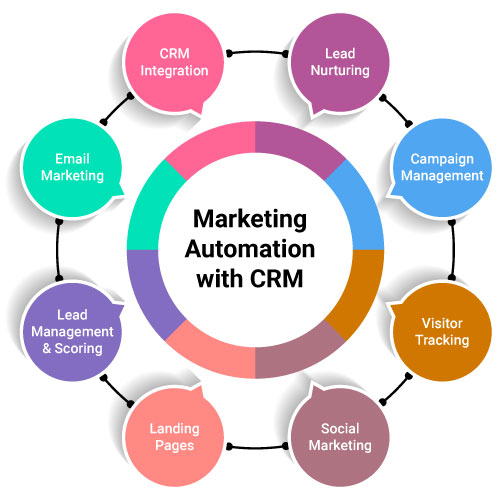
You can optimize the potential of each tool's capabilities and change how you engage and communicate with clients by combining CRM marketing automation. Here are a few examples:
-
Consolidating important actions and information to organize and streamline your company's prospecting and customer retention activities.
-
Capturing more advanced customer journey insights that sales and marketing can use to prioritize efforts.
-
Preventing wasted productivity and wasting valuable resources on poor leads.
Sales and marketing communications with prospects and consumers frequently use different languages or try to appeal to distinct pain points. Integrating marketing automation with CRM improves visibility and ensures that messages are consistent and tailored to different groups and individuals. If you ever update or edit your communications, both teams will be able to see the changes and adjust as needed.
Examples of CRMs with marketing automation
CRM marketing automation examples include:

Hubspot CRM is the best CRM marketing automation that automates sales, marketing, and customer service. It is a high-end CRM automation system. All of the fundamental CRM automation capabilities are available, including sales pipeline management, email sending, scheduling, and tracking, workflow management, database administration, lead scoring, social media integration, and calls. A free subscription for up to 1,000,000 contacts is also available, as well as easy integrations with third-party tools
 The Salesforce Sales Cloud platform provides outstanding CRM automation options. This CRM, which is suitable for medium and large businesses, provides both simple and advanced functions to automate your sales pipeline. The range of automation solutions given by the Salesforce CRM platform is rather long, ranging from the account, contact, and opportunity management to email workflows, documentation, and sales forecasting. It also facilitates interdepartmental communication by integrating contacts, calendars, emails, and tasks across several platforms. The Salesforce Essential plan, which costs $25 per user per month, is an excellent place to start for CRM automation beginners. In the future, you can upgrade your plan based on your needs.
The Salesforce Sales Cloud platform provides outstanding CRM automation options. This CRM, which is suitable for medium and large businesses, provides both simple and advanced functions to automate your sales pipeline. The range of automation solutions given by the Salesforce CRM platform is rather long, ranging from the account, contact, and opportunity management to email workflows, documentation, and sales forecasting. It also facilitates interdepartmental communication by integrating contacts, calendars, emails, and tasks across several platforms. The Salesforce Essential plan, which costs $25 per user per month, is an excellent place to start for CRM automation beginners. In the future, you can upgrade your plan based on your needs.
 Zoho CRM is a cloud-based CRM automation application designed for small businesses and startups. It includes lead management, deal management, forecasting, activity workflows, and account management, among other automation features. It also has a gamification platform that engages and motivates salespeople to meet their goals. Subscription levels for Zoho CRM start at $18 per month and can be upgraded depending on your needs
Zoho CRM is a cloud-based CRM automation application designed for small businesses and startups. It includes lead management, deal management, forecasting, activity workflows, and account management, among other automation features. It also has a gamification platform that engages and motivates salespeople to meet their goals. Subscription levels for Zoho CRM start at $18 per month and can be upgraded depending on your needs
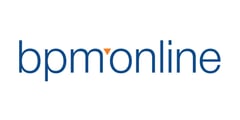 bpm'online CRM is an advanced customer lifecycle management software with CRM advanced features. This CRM tool's USP is its field sales management tool, which helps improve field sales procedures. Document flow automation, sales forecasting, and mobile sales are among the other features. It also allows for easy integration and synchronization with third-party systems. If field sales are a top concern for your company, consider investing in the bpm'online CRM automation software.
bpm'online CRM is an advanced customer lifecycle management software with CRM advanced features. This CRM tool's USP is its field sales management tool, which helps improve field sales procedures. Document flow automation, sales forecasting, and mobile sales are among the other features. It also allows for easy integration and synchronization with third-party systems. If field sales are a top concern for your company, consider investing in the bpm'online CRM automation software.
Conclusion: CRM vs Marketing Automation what to choose?
You are not required to choose between CRM and marketing automation platforms. Of course, you should know how to select the best CRM and what you want to utilize for automated email marketing. CRM and marketing automation software work together to achieve a shared objective.
Converting more leads into paying customers by moving them from the top to the bottom of your funnel. Allowing your automated tools to take care of the time-consuming repetitive tasks saves you time. The time you save might be used to improve and scale operations, develop new products or features, or simply enjoy more spare time.

.png?width=140&height=140&name=Noah%20(1000%20x%201000%20px).png)



